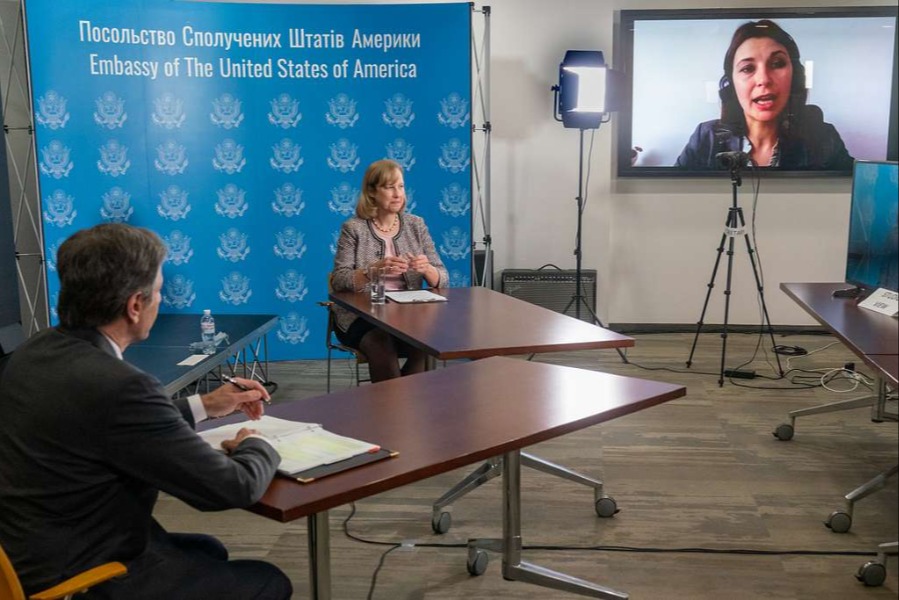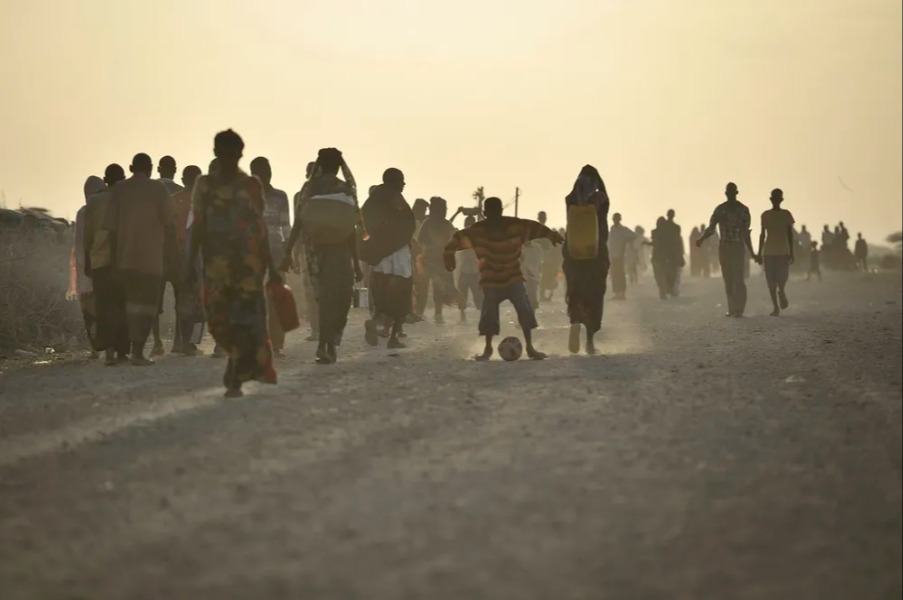Dispatch #2: Who is Running and From What?
BEKAA VALLEY, Lebanon — As I described in the first dispatch “Syria Displaced,” a year ago the Lebanese government all but closed its borders with Syria by changing the requirements so that fleeing violence and persecution were no longer valid criteria for entering the country.
Published by The Lawfare Institute
in Cooperation With

BEKAA VALLEY, Lebanon — As I described in the first dispatch “Syria Displaced,” a year ago the Lebanese government all but closed its borders with Syria by changing the requirements so that fleeing violence and persecution were no longer valid criteria for entering the country. Now Syrians can only cross for work, tourism or ongoing travel; the rest are left to their bloody fates on the other side of the border.
Still, a few manage to escape.
Souad, 56, sits on the floor of the one heated room in the family’s rented apartment that doubles as a sleeping area. She has been in Lebanon for three months. She and her family are from a village outside Deraa, a southwestern Syrian town that saw some of the very first demonstrations, before there was such a thing as the war in Syria. Since the beginning, for years, it has been rebel-held territory — until about ten months ago. [Names have been changed for individual’s protection.]
“When the shelling started we had to go on foot to another town,” she says, “Every time there were ‘baramil’ [the name of the half-ton barrel bombs favored by the regime], my daughter would stop; she couldn’t move from the fear.” They walked to one village, then another, fleeing Bashar al-Assad’s weapons. The terrain was all rocks and sand. Regime planes flew low overhead. “We were four — me, my two daughters, 18 and 24, and my 19-year-old son, Tariq.” Souad and the girls went on to Damascus to stay with another son, leaving Tariq behind. Being of military age, he was wanted by the regime to complete his military service, but he had refused to be a part of the killing. For him, the capital would have been too dangerous.
“In Damascus we were in a regime-held area. We were afraid of shelling from the rebels attacking the regime.”
One day, Tariq called.
He had taken a taxi to try to cross into Lebanon where he planned to meet his brothers who were already living there. He crossed the Syrian checkpoint. He was so close to freedom, or so he thought. But in the no-man’s-land between Syria and Lebanon the taxi driver explained to him that he would need proof of a hotel reservation and a thousand dollars if he was to have a prayer of getting in. So he had to turn back. The next time his mother heard her son’s voice it was when he called to tell her he had been taken by the regime at a checkpoint near the border. She has not heard from him since; it has been over six months now. She is particularly worried because in their hometown there were rumors that Tariq was helping the rebels. “But he wasn’t,” she says softly, tears slipping down her cheeks, “he wasn’t with anybody.”
She doesn’t know which side took her oldest son, Samir. A year and a half ago, he was driving with his cousin and another man from Deraa to Damascus for work. Militants stopped his car on the road: “we don’t know whose.”
“My brother in Damascus called,” says Mustafa, another son living in Lebanon, “and said, ‘Where is Samir? He hasn’t arrived.’” They have not heard from the three men since they left the house that day. “He has two boys. We haven’t heard anything.”
In Damascus, not knowing if her two sons were dead or alive, Souad had to go on. She had to think of her daughters. They tried to cross the border three times. Twice, they were turned away. On the third attempt, she was allowed through when she claimed she was going to visit her sons in Lebanon. For the last three months, the women have been in Lebanon illegally. Thus far, the government has not followed up on cases where people have entered on false pretenses and stayed. For many Syrian families, that threat weighs heavily.
In Lebanon, Souad’s family is among the lucky ones. Her sons have jobs, and the family can afford to rent an apartment. They are not in one of the makeshift camps. But in her mind, she is back in Syria with her other two sons.
Whom is she fleeing? Certainly the regime; they happened to be the ones dropping the bombs. But for Souad, it’s more about the violence itself. For years she and her family were able to stay in their home, relatively insulated from the violence tearing other parts of the country apart. But when the bombs came, it made little difference who was dropping them; in her hometown, it was the regime while in the capital, she feared rebel attacks in regime-held territory. Souad, like so many others, wants little more than a peaceful existence for herself and her family.
***
Khalid, 31, and his wife Haya, 22, are farmers from the countryside around Hama. They grew yams, cotton and pistachios in their fields. “We had everything,” says Haya.
Then came the war. “For five months, we were surrounded. Gas, electricity, water, all of it was cut off. It was the regime on one side and the rebels on the other. We saw the demonstrations against the regime back in 2011, but we weren’t with either side,” says Khalid.
“Every time there was shelling, we’d run away to the fields. We’d sleep under the trees. Everyone was afraid to go back. We weren’t alone. There were many others. We brought a bit of food and the neighbors helped us.”
When the rebels would take back the area, they would return to their houses.
“The revolutionaries would come to tell us in the field, 'come, it’s safe to come back,'” says Khalid, “Five times we had to leave our house. When people stayed behind when the army came, they were gone when we came back. Kidnapped, we didn’t know where they were.”
“We’d be there two or three days and then the regime’s planes and tanks would come.”
Khalid and Haya say they were neutral when the fighting started. “It was an agricultural area. No one was involved in politics.” But when the shelling began in their village, it was the rebels who came to their aid. “Each time they came to free the area.”
Now their village has fallen under military control.
“The army took over and it became a military area. All the houses were destroyed. The young men who are still there sent us pictures. We had two rooms, a living room, land. It’s all gone. There’s nothing left.”
Now, they are no longer neutral. When the rebels came to find them in the field, the couple started to trust them, and it was the regime’s bombs they were fleeing.
But the are no longer in Hama, or Syria at all. Eight months ago they fled over the mountains, taking along with their four small children. Their fifth child, Israa, was born in Lebanon.
Because of the new Lebanese border restrictions, the family used a smuggler to enter over the mountains. A cousin in Lebanon arranged for a man to pick them up from Hama. The group included six families, and they moved through areas in rebel control, taking almost nothing with them: “When the shelling starts, you can’t take anything.”
When they first arrived in Lebanon, they shared a tent with relatives who had come earlier in the Bekaa Valley. Khalid and Haya had been there twice before for work. “We’d work together, the children next to us, in the field,” says Khalid. This time he found a job at a plant that disposes of medical waste. He earns 700,000 Lira ($462) a month. Haya takes care of the children, who don’t go to school.
“There’s no school here and they’re expensive. Of course, if we were still in Syria they would go to school,” says Khalid. Haya explains that if one of them falls ill, they go to the pharmacy. Doctors are a luxury they cannot afford.
The rest of their family is still trapped on the other side of the border. Last Khalil and Haya heard, they were living in a camp for displaced people inside Syria near the Turkish border.
“We want to go back to our land” when the war ends, Haya says. But as far as they’ve been able to find out, their village now is a ghost town.
“There’s no one left in the village. They all left.”
***
To many refugees, the identity of whom they fled was trivial. What matters is that they could no longer keep themselves and their families safe inside Syria. And yet, over the last year, the burders of neighboring countries have closed one by one. Apart for the occasional new arrival, the majority of refugees in Lebanon have been there for quite some times, often years. Some fled the bombs and siege-tactics of the regime, while others left because of rebel bombardment in regime areas. Old and new arrivals alike are seeking the most basic security.
Dana Sleiman, spokesperson for the United Nations High Commission for Refugees in Lebanon notes that, “Most people speak about shelling and bombing, insecurity and violence in general.” And refugees in Lebanon are not alone in this sentiment.
One NGO worker who works with refugees in Lebanon said that for the most part she’s heard people talk about, “regime bombardment with a few people fleeing ISIS.” She adds that she also sees “a lot of people fleeing the countryside of Aleppo-- for some of them regime bombardment was the major factor, while others were being harmed by extremist groups. In addition to bombardment a fair number fled after a personal, violent encounter with regime soldiers or soldiers from other military groups, including kidnapping and rape, sometimes children kidnapped with parents and made to witness the torture of the parents.” In sum, people in Lebanon have fled a vast array of horrors.
In November, I interviewed refugees on the island of Lesbos. These refugees included both Syrians and Iraqis, among them many Kurds and Christian minorities. Many were fleeing the onslaught of the Islamic State, others ran from the Syrian regime. Still others had escaped the Russian bombardment. There, most refugees have come directly from Syria or Iraq and moved quickly through Turkey and on to Europe. They seized the opportunity to put as must distance as possible between themselves and their pasts, and few had remained in the border countries for long. But they share the same impulses of those now stuck in places like Lebanon. Aside from the occasional activist, very few want to talk politics much along the way.
They all ran from certain death and destruction. For most, which group was most responsible is far from being their primary concern. Whoever dropped those bombs, for these refugees all the work, and energy, and focus, and worry must now be on protecting their new fragile survival.




